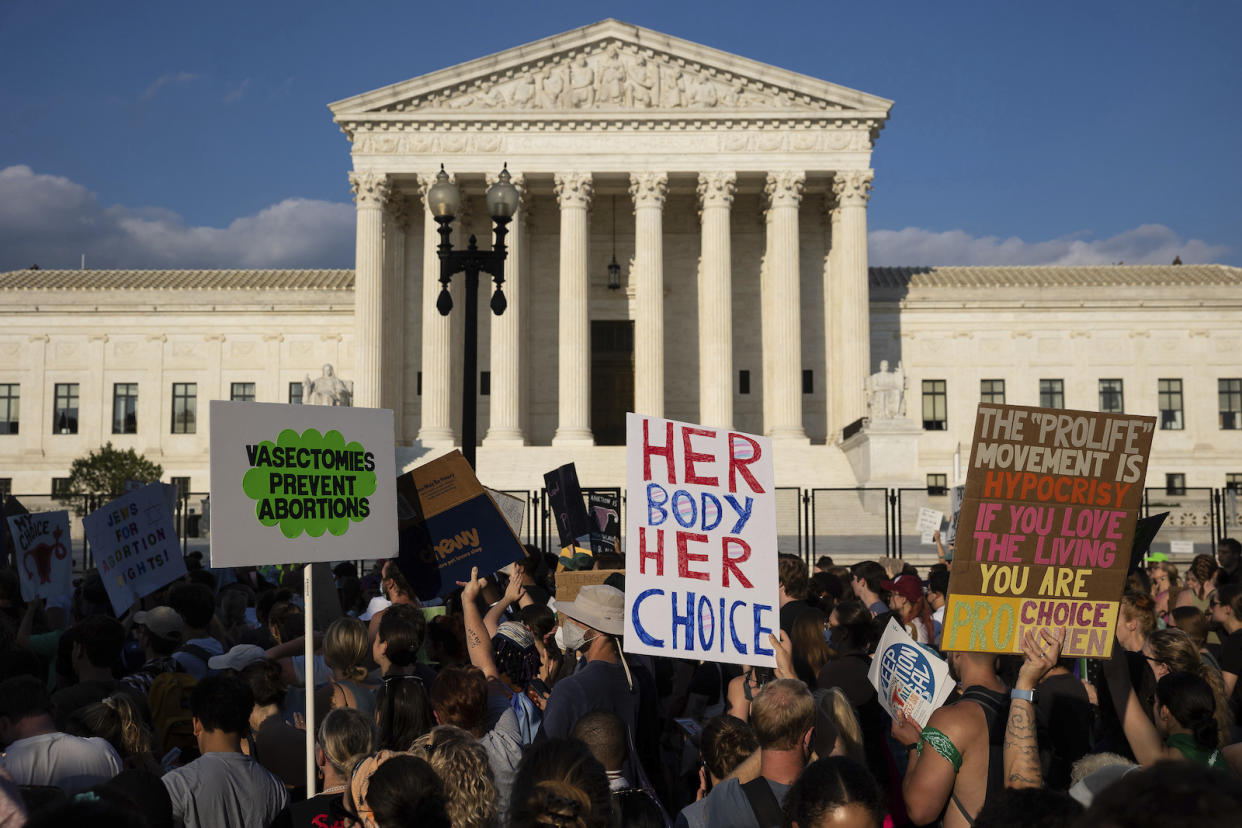Pro-Choice Groups Prepare State-by-State Blitz to Defend Abortion Access

Hillary Schneller knew what to expect when the Supreme Court ultimately overturned Roe v. Wade. The attorney at the Center for Reproductive Rights had been part of the team that defended a woman’s right to choose before the high court in Dobbs vs. Jackson Women’s Health. She heard Justice Samuel Alito’s line of questioning during the December oral arguments, the first sign for many of Roe’s doom. She saw the leaked draft in May. Even so, “this is a bit of a colossal bomb that dropped today,” she said Friday afternoon.
The “colossal bomb” effectively banned or significantly restricted abortion access in more than half of states. It also set in motion a new legal strategy for attorneys who protect abortion rights — one that lawyers at organizations like the Center for Reproductive Rights, Planned Parenthood, and the American Civil Liberties Union are now devising as states act fast to push restrictions under the new legal precedent. “The federal floor of protection for the right to abortion no longer exists,” Schneller says. “It will now have to be a fight, state by state, law by law, to try to mitigate the harm of bans that will likely soon take effect.”
More from Rolling Stone
One key strategy will be legal challenges to so-called “trigger” laws on the books in 13 states. The details of the laws vary, but they’re all designed to ban or severely limit abortion the moment Roe is overturned. “It’s an unusual way of legislating,” says Helene Krasnoff, the vice president of public policy litigation and law at Planned Parenthood. “I’m not really aware of other areas of law that have future effective dates contingent upon Supreme Court cases.” Schneller predicts lawsuits will be filed against trigger bans in state courts starting next week.
Another route will be seeking abortion protections through state constitutions, a proven method through which 11 states have granted such rights through legal challenges. “A lot of people don’t realize that the federal constitution is a floor, it’s not a ceiling,” says Alexa Kolbi-Molinas, the deputy director of the ACLU Reproductive Freedom Project. “They provide greater independent protections than the federal constitution.” Michigan Gov. Gretchen Whitmer, for example, filed a lawsuit against the state’s pre-Roe abortion ban on the basis of the state constitution’s due process clause, which guarantees bodily autonomy. There’s also an ongoing challenge to Florida’s 15-week abortion ban, set to take effect in July, that hinges on that state constitution’s right to privacy.
Some of the legal offenses will also look to expand abortion rights, not just reverse bans. The ACLU’s Kolbi-Molinas mentioned an ongoing litigation against a set of laws in North Carolina that, together, reduce access to abortion in a state where its still accessible. “If it’s successful, we will have protected and expanded the right in a critical region in the country,” she says, alluding to the number of North Carolina’s neighbors in the South that have restricted abortion.
But, overall, the attorneys are overall bracing for a legal mess. “Without this federal floor of protection that Roe provided, we see a lot of interstate conflict,” Schneller explains. “It’s going to be really chaotic, both for patients and providers, and then ultimately in the courts to figure out what comes next.” Schellner observes that the looming chaos undermines a key argument in the Dobbs decision — that reversing Roe would somehow solve the turmoil. “We are in for an even more harmful next several weeks and months and years,” she warns.
For all the possible legal vectors, the Dobbs decision proved that the courts are a poor pathway for broadly securing rights. “While there will absolutely be a legal strategy in federal and state court, we know the courts aren’t going to save us here,” Kolbi-Molinas says. She points to the 17-year gap between Bowers v. Hardwick, which ruled against protections for gay rights under the constitution, and Lawrence vs. Texas, which overturned it, as a model for success — one that was contingent on political mobilization and activity at the state and local level to “change hearts and minds,” she explains. “All of that is going to have to be part of the strategy that is going to save us.”
Best of Rolling Stone

